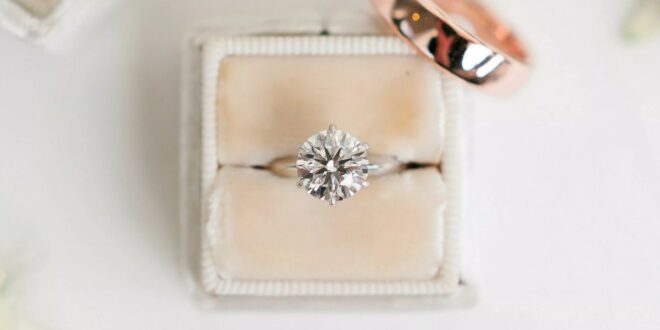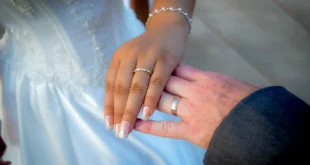Choosing the perfect wedding band to complement your engagement ring is an important decision when planning your wedding. The wedding band serves as a symbol of your eternal commitment and love, and it should enhance the beauty of your engagement ring. With so many options available, finding the right wedding band can be overwhelming. In this article, we will guide you through the process of selecting the perfect wedding band for your engagement ring, ensuring that you make a choice that reflects your personal style and complements your engagement ring flawlessly.
Understanding the Basics
Before diving into the world of wedding bands, it’s essential to understand the basics. Wedding bands come in various metals, including gold (yellow, white, or rose), platinum, and palladium. Each metal has its unique characteristics and price points, so consider your preferences and budget when choosing the metal for your wedding band. Additionally, familiarize yourself with the different band styles such as classic, diamond-studded, eternity, and curved bands.
Consider Your Engagement Ring
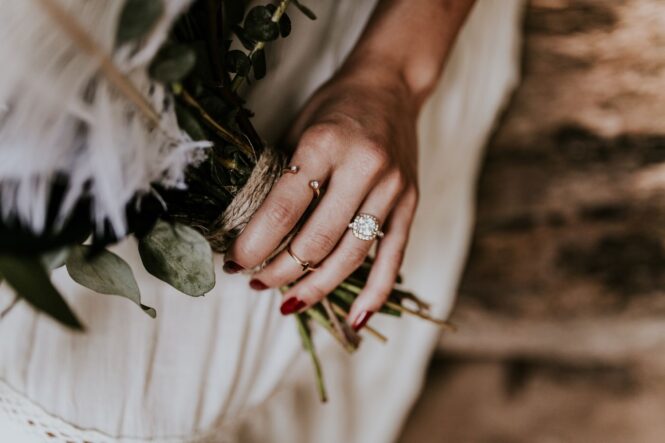
The first step in selecting a wedding band is to consider your engagement ring. Look at its design, metal type, and any decorative elements it may have. If your engagement ring has intricate detailing or a unique shape, a curved wedding band might be the perfect choice to ensure a seamless fit. For a classic solitaire engagement ring, a plain or diamond-studded wedding band can complement it beautifully. Take into account the color of the metal as well, ensuring that the wedding band and engagement ring metals harmonize.
Match the Metals
When choosing a wedding band, it’s important to consider the metal of your engagement ring. Matching the metals creates a cohesive and balanced look. For instance, if your engagement ring is made of white gold, it’s best to select a wedding band in the same metal to maintain a consistent aesthetic. Mixing metals can be done intentionally for a contrasting effect, but it’s crucial to ensure that the combination enhances the overall appearance rather than creating a disjointed look.
Complementary Styles
The style of your engagement ring should also influence the choice of your wedding band. If your engagement ring features intricate details, a simple and understated wedding band can be an excellent choice to prevent overwhelming the overall look. On the other hand, if your engagement ring is more minimalistic, you have the opportunity to experiment with different styles of wedding bands. Consider diamond-studded bands, eternity bands, or even custom-designed bands to add a touch of uniqueness.
Curved Bands for Unconventional Engagement Rings
For engagement rings with unconventional shapes or designs, curved wedding bands can be the perfect solution. These bands are specially designed to wrap around the contours of your engagement ring, creating a harmonious and seamless pairing. Curved bands add a stylish and unique touch, allowing you to showcase the individuality of your engagement ring while adding an extra layer of elegance.
Consider Your Lifestyle
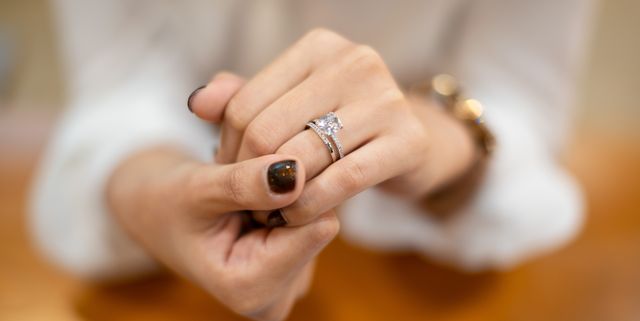
When choosing a wedding band, it’s important to consider your lifestyle and daily activities. If you have an active lifestyle or work with your hands frequently, you might want to opt for a more durable and low-maintenance metal such as platinum. Platinum is highly resistant to wear and tear, making it a suitable choice for those who lead an active lifestyle. Additionally, consider the setting of any gemstones on your wedding band to ensure they are secure and won’t be easily damaged.
Try Before You Buy
To ensure the perfect fit and look, it’s recommended to try on various wedding bands with your engagement ring. Visit jewelry stores and try different styles, widths, and shapes to see how they complement your engagement ring. Trying on the bands will give you a better sense of how they look and feel on your finger, helping you make an informed decision. It’s also a good opportunity to discuss customization options with jewelers and explore any personalization you might want for your wedding band.
Budget Considerations

Setting a budget is an important aspect of choosing a wedding band for your engagement ring. It allows you to narrow down your options and make decisions that align with your financial capabilities. Here are some key considerations to keep in mind when it comes to budgeting for your wedding band:
1. Determine Your Overall Wedding Budget
Before allocating a specific amount for your wedding band, it’s crucial to establish your overall wedding budget. This will give you a clear understanding of how much you can comfortably allocate to different aspects of your wedding, including the rings. Take into account all the expenses associated with your wedding, such as venue, catering, attire, and decor. Once you have a comprehensive view of your budget, you can allocate a reasonable portion for your wedding bands.
2. Research Average Price Ranges:
It’s helpful to research the average price ranges for wedding bands to get an idea of what to expect. The cost of a wedding band can vary depending on factors such as the metal type, design complexity, presence of gemstones, and brand reputation. By researching and understanding the average price ranges, you can set a realistic budget and avoid any surprises.
3. Prioritize Your Must-Haves:
When working with a budget, it’s important to prioritize your must-haves. Determine the features that are most important to you in a wedding band. Do you prefer a specific metal type? Are gemstones or intricate designs a priority for you? By identifying your non-negotiables, you can allocate a larger portion of your budget towards those elements while being more flexible with other aspects.
4. Consider Metal Options:
The choice of metal for your wedding band will significantly impact the cost. Precious metals like platinum and gold tend to be more expensive compared to alternative options like palladium or sterling silver. Each metal has its unique characteristics, so consider your preferences and budget when making a decision. Keep in mind that some metals may require additional maintenance or resizing costs in the long run, so factor in any potential ongoing expenses.
5. Simplify the Design:
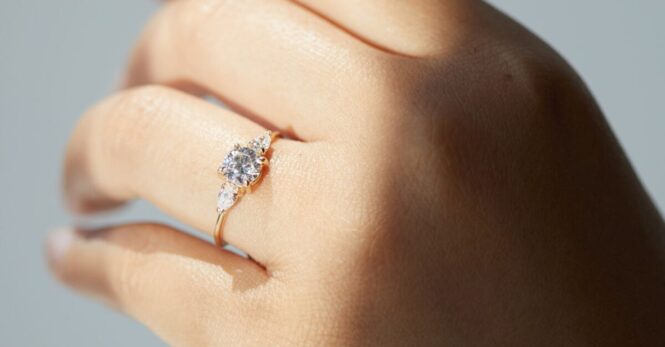
Elaborate designs and intricate details can drive up the cost of a wedding band. If you have a limited budget, consider opting for a simpler and more streamlined design. Classic plain bands or those with minimal embellishments are often more affordable while still maintaining elegance and timelessness. Remember, simplicity can be just as beautiful and meaningful as more elaborate designs.
6. Explore Alternative Gemstone Options:
If you desire some sparkle in your wedding band but diamonds are beyond your budget, consider alternative gemstone options. Gemstones like sapphires, rubies, or even moissanite can offer a stunning and budget-friendly alternative. These gemstones come in various colors and can add a unique touch to your wedding band while keeping the cost down.
7. Shop Around and Compare Prices:
To ensure you get the best value for your budget, it’s essential to shop around and compare prices from different jewelers. Visit local jewelry stores, explore online retailers, and inquire about pricing and options. Keep in mind that reputable jewelers may charge a premium for their craftsmanship and quality, but it’s important to strike a balance between price and reliability. Comparing prices and offerings will help you make an informed decision and potentially find special discounts or promotions.
8. Consider Customization:
Customizing your wedding band allows you to have a unique piece that fits your style and budget. Some jewelers offer customization options where you can select specific design elements, metal types, and gemstones according to your preferences. Customization gives you more control over the cost by allowing you to choose features that align with your budget while still achieving a personalized and meaningful wedding band.
Remember, while it’s important to consider your budget, the value of your wedding band goes beyond its monetary worth. It symbolizes your love and commitment, so choose a band that holds sentimental value for you and your partner. By being mindful of your budget and exploring various options, you can find a wedding band that meets both your financial requirements and your aesthetic preferences.
Conclusion:
Choosing the perfect wedding band for your engagement ring is a personal and meaningful decision. By considering factors such as metal compatibility, complementary styles, lifestyle considerations, and trying on different options, you can ensure that you find the ideal wedding band that reflects your style, enhances your engagement ring, and symbolizes your everlasting love. Take your time, explore various options, and consult with reputable jewelers to make an informed decision that you will cherish for a lifetime.
 Imagup General Magazine 2024
Imagup General Magazine 2024
